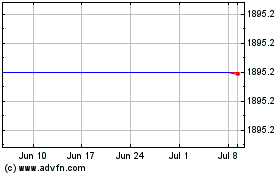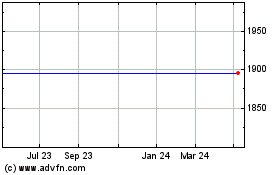Shell Sets More Ambitious Emissions Goals
April 16 2020 - 7:21AM
Dow Jones News
By Maitane Sardon
Royal Dutch Shell PLC agreed on Thursday to set bolder
carbon-emissions goals after engaging with a group of investors
representing $40 trillion in assets under management.
The move comes as the oil sector faces growing pressure from
climate-aware investors and headwinds due to the coronavirus
pandemic and low oil prices. The International Energy Agency said
Wednesday that it expects global oil demand to fall by 9.3 million
barrels a day this year as a result of government-imposed
lockdowns.
The Anglo-Dutch company said it aims to reduce the carbon
footprint of the fuel it sells to its customers by 30% by 2035 and
65% by 2050. It also said it will target net-zero emissions from
its own operations by 2050 and prioritize serving businesses and
sectors that aim to have net-zero emissions by 2050.
"Society's expectations have shifted quickly in the debate
around climate change," Chief Executive Ben van Beurden said.
"Shell now needs to go further with our own ambitions, which is why
we aim to be a net-zero emissions energy business by 2050 or
sooner. Society, and our customers, expect nothing less."
Investors behind the engagement process welcomed the
announcement and said they will continue to monitor the steps taken
by Shell and engage with other companies in the sector.
"This announcement... is indicative of Shell's confidence in not
only navigating the immediate situation but rightly sets the focus
on developing net-zero pathways in key sectors that shape the
demand for energy," said Adam Matthews, director of ethics and
engagement for the Church of England Pensions Board.
However, some investors in the oil-and-gas company said the new
targets aren't enough to reach the goals of the Paris
Agreement.
"With today's new ambition... Shell's board is still failing in
its responsibility to show leadership at a time of devastating
climate change," said Mark van Baal from Follow This, a group of
more than 4,600 shareholders in oil companies including Shell.
Investors also said the investments the company is making in new
energy sources--around $2 to $3 billion a year--falls short of the
$180 billion Barclays estimates Shell needs to invest by 2050 in
order to meet its target.
The sector is increasingly facing pressure from investors to
tackle emissions, especially as governments ready regulations to
punish big polluters.
On Wednesday, a group of investors representing 1.35% of French
oil major Total SA's capital filed a resolution at the company
asking it to set absolute emissions-reduction targets aligned with
the Paris Agreement.
In March, British oil-and-gas company BP agreed to draft a
shareholder resolution to be voted on next year that would enshrine
its pledge to reach carbon neutrality by 2050.
Norwegian energy major Equinor ASA in February announced new
climate goals, including its intention to reach carbon neutrality
from its operations by 2030, boost renewable energy tenfold by 2026
and cut its carbon intensity by at least half by 2050.
Write to Maitane Sardon at maitane.sardon@wsj.com
(END) Dow Jones Newswires
April 16, 2020 07:06 ET (11:06 GMT)
Copyright (c) 2020 Dow Jones & Company, Inc.
Shell (LSE:RDSA)
Historical Stock Chart
From Aug 2024 to Sep 2024

Shell (LSE:RDSA)
Historical Stock Chart
From Sep 2023 to Sep 2024
